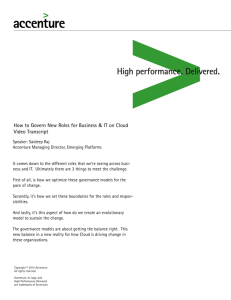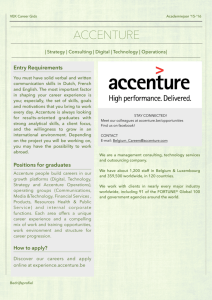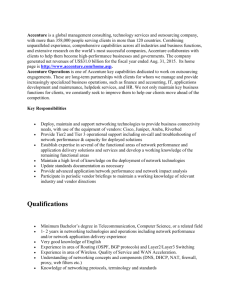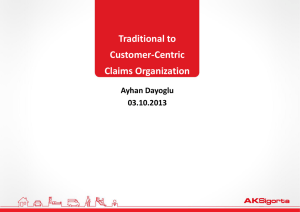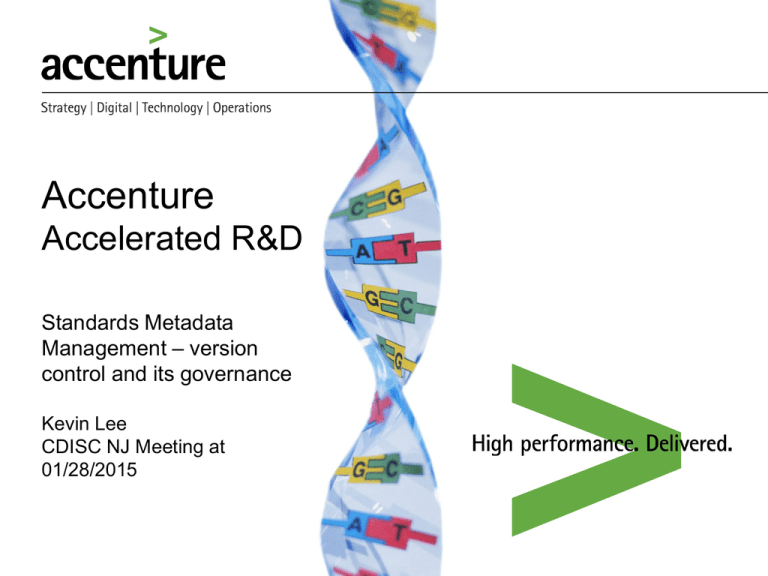
Accenture
Accelerated R&D
Standards Metadata
Management – version
control and its governance
Kevin Lee
CDISC NJ Meeting at
01/28/2015
We help our Clients deliver better
outcomes, so they can improve
the quality of people’s lives.
Happy New Year
Year of Sheep
• 2015
• 2003
• 1991
• 1979
• 1967
• 1955
• 1943
© 2015 Accenture All Rights Reserved.
2
Agenda
Introduction of Standards Metadata
Management
Version Control
Governance
Final Thoughts
© 2015 Accenture All Rights Reserved.
3
Introduction of Standards
• Industry Standards
• Clinical Data Interchange Standards Consortium
(CDISC) – CDASH, SDTM, ADaM and LAB
• NCI CT
• HL7
• eCTD (electronic Common Technical Document)
• Company Standards
• Global Standards
• Therapeutic Standards
• Business Unit Standards
© 2015 Accenture All Rights Reserved.
4
Introduction of Metadata Management
• Definition
• Managing data about other data
• Examples of metadata
Variable
Name
Variable Label
Type
STUDYID
Study Identifier
Char
DOMAIN
Domain Abbreviation
Char
USUBJID
Unique Subject
Identifier
Char
© 2015 Accenture All Rights Reserved.
CT
DM
Role
Core
Identifier
Req
Identifier
Req
Identifier
Req
5
Examples of Metadata Management
•
•
•
•
•
•
•
•
Creating new standards (e.g., variables and domains)
Modifying the attributes (e.g., label, type) of current standards
Adding the new attributes to current standards
Archiving the standards
Managing the information that transforms data into a new
structure (e.g.: CDASH to SDTM)
Leveraging the Schedule of Events table to determine the data
domains required for a study
Assigning versions (e.g., major or minor) to standards after
changes
Maintaining multiple versions of standards (e.g., SDTMIG
3.1.2, 3.1.3)
© 2015 Accenture All Rights Reserved.
6
Industry CDISC Standards versions
•
•
•
•
•
•
•
•
•
•
CDASH – 1.1
SDTM (IG) – 1.2 (3.1.2), 1.3 (3.1.3), 1.4 (3.2)
PRM – 1.0
LAB – 1.01
SENDIG – 3
ADaM (IG) – 2.1 (1.0)
SMD-XML – 1.0
ODM-XML – 1.3.1, 1.3.2
Define-XML – 1.0, 2.0
DataSet-XML – 1.0
© 2015 Accenture All Rights Reserved.
7
Company Standards versions
• Industry + company-specific standards
• Global standards version
•
•
GS v1 – CDASH 1.1, SDTM (IG) 1.3(3.1.2), ADaM(IG)
2.1(1.0)
GS v2 – CDASH 1.1, SDTM (IG) 1.4(3.2), ADaM(IG)
2.1(1.0)
• Annual global standards version
•
•
•
GS v2013
GS v2014
GS v2015
© 2015 Accenture All Rights Reserved.
8
Why version control is important?
• FDA Requirements
•
•
CDISC Standards compliant data submission
Data Standards Catalog
• Versions that FDA supports and requires.
• Submission document
•
•
SDRG(Study Data Reviewer’s Guide)
ADRG(Analysis Data Reviewer’s Guide)
• Multiple studies employed different versions across
the duration of a submission
•
•
Phase I used SDTMIG 3.1.2, but Phase II and III used
SDTMIG 3.1.3.
ISS/ISE
© 2015 Accenture All Rights Reserved.
9
How to control versions/ How to
manage standards?
© 2015 Accenture All Rights Reserved.
10
Standards Metadata Management vs
Governance
Management
Governance
• Making decisions
• Setting the
environment where
others can manage
effectively
© 2015 Accenture All Rights Reserved.
11
What is governance?
According to a report by
Boeing, from 2001 through
2010, the number of fatalities
per one million flight hours is
less than one. It attributed
the success rate of air traffic
control to:
Process
Specified roles/responsibility
Technology/system
© 2015 Accenture All Rights Reserved.
12
What is standards governance?
Standards governance is:
• Oversight for the development and maintenance of clinical data
standards
• An instrument that ensures that a standard is developed efficiently,
consistently, and properly used across the clinical trials
organization
• Assurance that maximum process efficiency from a standardsbased clinical data lifecycle is achievable
Process – change requests and governance workflow
Specified roles/responsibility – SMEs who ensure
standards are applied appropriately
Technology/system – technology and systems that
support change requests and governance workflow
© 2015 Accenture All Rights Reserved.
13
Three key components of Standards
Governance
Technology
People
Process
© 2015 Accenture All Rights Reserved.
14
People of Standards Governance
Below is a general example of
some roles and responsibilities
that sponsors implement to
effectively carry out their
standards governance.
Role
Skillset
Requestors
• Programmers
Request a new or revised standard
• Data Management
Developers
• Standards SME
Develop the metadata for the
• Programmers
standard
• Data Management
Approvers
• Standards SME
© 2015 Accenture All Rights Reserved.
Responsibility
Approve the new or revised
standard
15
Standards Group/SME in Governance
•
•
© 2015 Accenture All Rights Reserved.
Types
• Functional SME
• Centralized
Standards Group
• Advisory Group
Responsibility
• SME for each
business unit (e.g.
DM) – develop the
standards
• Advisory/Centralized
Standards Group –
approve the
new/change
standards
16
Governance Process
• Workflow
• Definition
•
•
An orchestrated and repeatable pattern of business activity
enabled by the systematic organization of resources
A sequence of operations, declared as work of a person or
group.
© 2015 Accenture All Rights Reserved.
17
Examples of Governance Workflow
SDTM DM
(Developer)
© 2015 Accenture All Rights Reserved.
QC (Validator)
CDISC
compliance
checks
(OpenCDISC)
18
Governance Process in Standards
• Systematic business activities by standards resources
that manage the standards.
• Examples of Types: New Request, Modify and Retire
• Workflow: Request, Development and Approval
Change
Request
Implementation
• Assessment
• Impact
• Review
• Approval
Development
• Technical
• Subject Matter
© 2015 Accenture All Rights Reserved.
19
Examples of “Modification” workflow of
Standards Governance
email
notification to
Developer
Start
Notify
Requestor
No
Human task
System task
Email Notification
Standards
Change
Request
Notify
Developer
Review the
request
Request is
appropriate?
Yes
Assign the
appropriate
SME
Developer
Requestor
email
notification to
assigned SME
email
notification to
Developer
Reviewer
Final Reviewer
Notify the
assigned
SME
System
Yes
Notify
Requestors
and
Developers
Update on
Standards
and its
version
Pass or Fail
for Standards
Change
Review
Standards
Change
Notify
Reviewer
Change
Standards
No
© 2015 Accenture All Rights Reserved.
20
Technology of Standards Governance
• Definition: The system/technology which people
and workflow of standards governance operates on
• Evolution:
Metadata
Repository
Team Site
or Share
point
Spreadsheetbased
© 2015 Accenture All Rights Reserved.
21
Metadata Repository (MDR)
• General definition: a database created to store
metadata.
• Its function in Standards Governance:
•
•
•
•
•
•
Stores Standards metadata – Global, TA, Compound and
Study level
Defines the roles and responsibility of people
Defines the business process
Drives roles-based, system-driven business process
Develop and maintain standards(e.g., version controls)
Stores the history of all the activities(e.g., requestor,
approvals, dates and time, duration)
© 2015 Accenture All Rights Reserved.
22
Metadata Repository (MDR) continued
• Benefits
•
•
•
•
•
•
•
•
Data-based management, not document-based
More systemic/organized metadata management
System-based governance workflow
Control data flow, then control business process
Improve business process
Time-efficient, process-efficient
History of all the activities
Transparency
© 2015 Accenture All Rights Reserved.
23
Final Thought
Governance
Standards
© 2015 Accenture All Rights Reserved.
Management
24
Sneak preview on 2015
•
•
•
•
•
Metadata Repository
Data Modeling on Standards metadata
Process metadata
Study definition Metadata
Automated E2E clinical data development
© 2015 Accenture All Rights Reserved.
25
Contacts and Questions
Kevin Lee
Email:
kevin.s.lee@accenture.com
Linkedin:
www.linkedin.com/in/kevinlee
1995
Tweet: @HelloKevinLee
Blogs: HiKevinLee.tumbrl.com
© 2015 Accenture All Rights Reserved.
26

